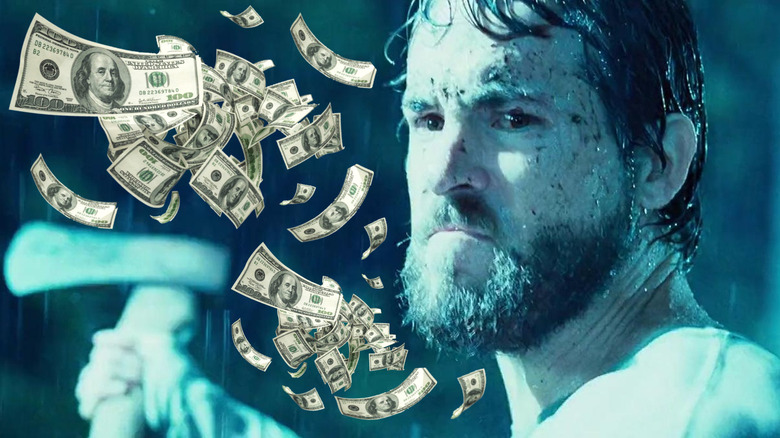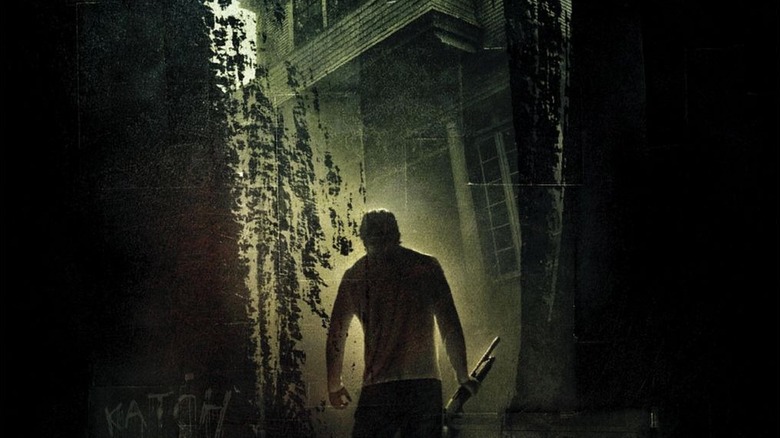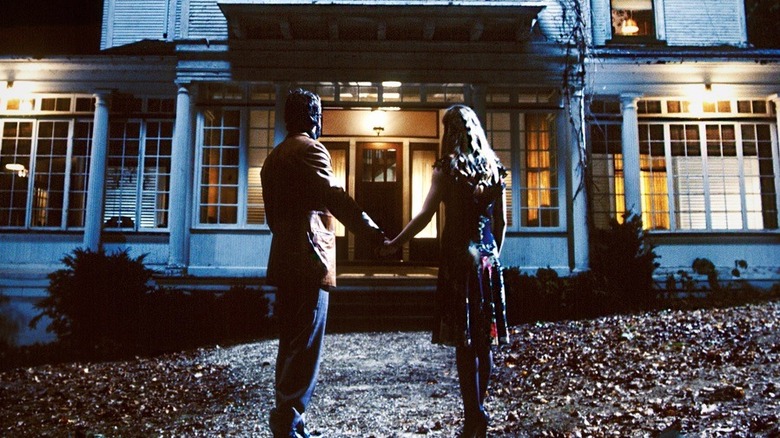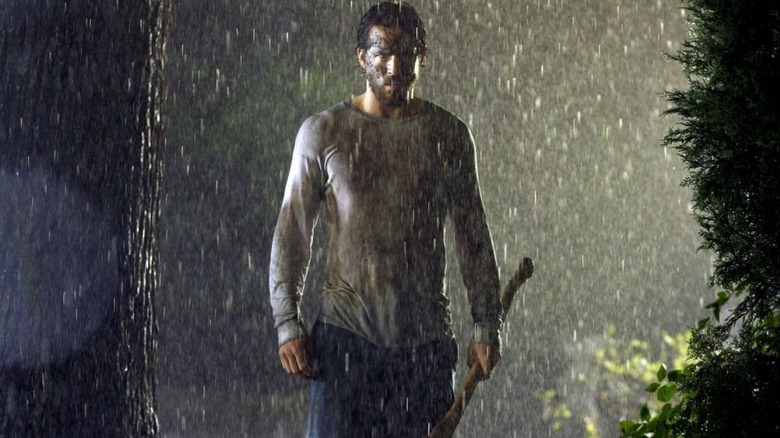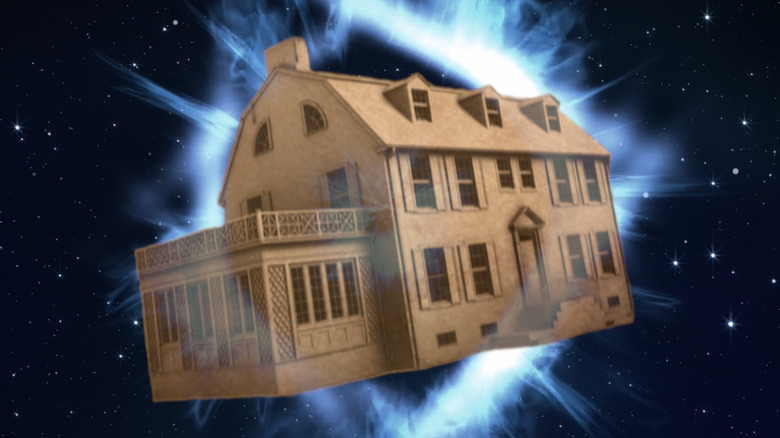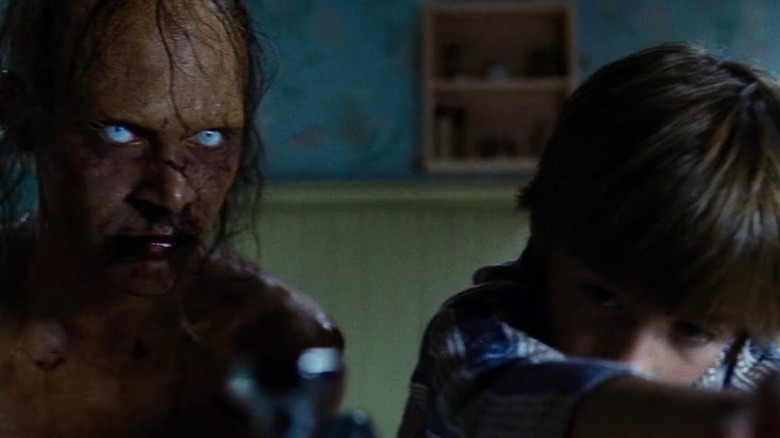20 Years Ago, A Panned Ryan Reynolds Box Office Hit Kept The Horror Remake Craze Alive
(Welcome to Tales from the Box Office, our column that examines box office miracles, disasters, and everything in between, as well as what we can learn from them.)
"It was a story that was definitely worth retelling. There are legions of fans out there that would love to see this story told." Those are the words of Ryan Reynolds speaking with RadioFree.com in 2005 about the "Amityville Horror" remake, which came about right as he was rocketing up Hollywood's A-list. "The first one, with all due respect to the people that were a part of it ... I just don't think it stood the test of time at all."
Whether or not one agrees with Reynolds' sentiment about 1979's "The Amityville Horror," which was inspired by an infamous true story, Hollywood was ready to sign on the dotted line based on this logic at the time. Not only was Reynolds a rising star, but horror remakes of previous hits were also all the rage in the early 2000s. It almost seemed like a license to print money. Whether or not the movie was any good almost felt irrelevant, as this remake would go on to prove when it arrived in theaters.
In this week's Tales from the Box Office, we're looking back at "The Amityville Horror" remake in honor of its 20th anniversary. We'll go over how the film came to be, how it became the latest entry in the remake craze at the time, why Reynolds took things a little too far during production, what happened when the movie opened theatrically, what occurred in the aftermath of its release, and what lessons we can learn from it two decades removed. Let's dig in, shall we?
The movie: The Amityville Horror (2005)
The movie as we know it follows George Lutz (Reynolds) and his wife Kathy (Melissa George) as they move into a beautiful new house in the small town of (you guessed it!) Amityville. They think the place is too good to be true, mostly because it is: The low price was due to the former tenant murdering his family after allegedly being possessed by the devil. Horror ensues.
As mentioned, the early mainstream horror in the 2000s was largely defined by high-profile remakes. Many of these movies were not particularly good (see, for just one example, 2005's "The Fog"), while others were unexpectedly strong (see: the 2004 "Dawn of the Dead"). The main thing most of these movies had in common is that they were making an awful lot of money. In many cases, that's pretty much the only requirement for Hollywood to chase a trend. So, that's exactly what studios did.
One of the leaders of the pack in this department was Platinum Dunes, the production company co-founded by action director extraordinaire Michael Bay. After finding success with 2003's "The Texas Chainsaw Massacre" remake, which brought in $108 million globally at the box office against a mere $9.5 million budget, Bay and Co. at Platinum Dunes set about finding other horror properties they could give the remake treatment. Enter "Amityville."
The Amityville Horror remake hit some speed bumps along the way
Much like the 1979 film that preceded it, the 2005 remake was also based on Jay Anson's book, also titled "The Amityville Horror." Unfortunately, this new take on the story didn't sit well with the real George Lutz. As he explained in a 2005 interview with GhostVillage.com:
"When they did this remake, and when we got wind that they were even considering doing it, I had my attorney get a hold of them via a letter and say we would really like to know what you're doing here, in so many words. We don't think you have the right to do this. If you think you do, we'd like to talk to you about it."
Those legal issues were still unresolved by the time Lutz passed away in 2006. So, MGM proceeded with the remake. To helm the reimagining of the very famous tale, the studio tapped music video helmer Andrew Douglas. The director had an interesting approach, explaining in a 2005 interview that he chose not to watch the original "Amityville Horror" ahead of production:
"I haven't seen the original version since I was a kid, and I deliberately didn't see it here because my understanding was that I was being asked for a new interpretation. So, I mean the script, the kind of basic architecture of the story is right on the original film but I just deliberately didn't see it because I think one of the things I was being asked to do by delivering a new interpretation was to some extent, to try and deliver new scares."
Ryan Reynolds gets possessed by the acting bug on Amityville
At the time, Reynolds was one of the top rising stars in Hollywood. This was still more than a decade before he achieved next level superstardom with the R-rated smash hit "Deadpool," but he already had "Van Wilder" and the ill-fated "Blade: Trinity" under his belt. Because of his reputation as a handsome, funny leading man, Douglas was actually hesitant to cast Reynolds. As the director explained in 2005:
"His performance was chilling. What I was scared of was his handsomeness and his size, you know, he's a beautiful looking man, but he just sold it so strongly, that the very things I was scared of, he just managed to, like Jack Nicholson in 'The Shining,' make that even more creepy."
It's easy to see why the studio wanted Reynolds and the actor showed up with his game face on, arguably to a fault. Chloë Grace Moretz and Jesse James played the Lutz children in "The Amityville Horror" and, during one scene, Reynolds slapped James, which was not in the script. Reynolds later chalked up the incident to him being caught up in the moment:
"I didn't mean to do it. It wasn't hard or anything. He looked up like he just won the lottery. It was just so cool to him. And I look over and the script supervisor's crying, and I'm trying to apologize to her. I don't know what's happening."
While this certainly wasn't a good look, James apparently handled it well and the production moved on. Whether or not one chooses to believe such things, Reynolds and others also claimed bizarre things happened on the set while filming, which certainly helps sell the narrative of a haunted house movie. "I think a lot of people make that stuff up to sell their movie, but there was some weird stuff that happened," Reynolds noted.
The financial journey
Despite the issues behind the production, the relatively inexperienced Douglas, with the help of Platinum Dunes, United Artists, and MGM, got the film made for $19 million. Given that Reynolds probably gets paid more than that per movie now, that seems like a bargain. Speaking of Reynolds, the movie was largely sold to the public as a standard haunted house flick, with the notable exception of the actor's chiseled abs being fully on display. One could perhaps attribute those abs for being the reason the film succeeded commercially in spite of downright lousy reviews.
Bad reviews aside (the movie has a 23% rating on Rotten Tomatoes), "The Amityville Horror" hit theaters on April 15, 2005. That frame has traditionally been a fairly quiet time for Hollywood (it certainly was 20 years ago), but it can also be fruitful for the right movie. Turns out, this was the right film after all. Indeed, the remake topped the charts on its opening weekend with a $23.5 million domestic gross. It wasn't facing particularly stiff competition either, with films like "Sahara" and "Fever Pitch" being on their second weekends. Elsewhere, Robert Rodriguez's R-rated comic book movie "Sin City" was in its third frame.
The "Amityville Horror" remake was forced to give up the top spot to "The Interpreter" the following weekend, but it only dropped 42%, which is a remarkable hold for a movie with such poor reviews. 2009's "Friday the 13th," another Platinum Dunes joint, dropped more than 80% in its second weekend, for example. Audiences ate it up all the same. Ultimately, the movie didn't fall out of the top 10 until "Monster-In-Law" arrived in mid-May. By then, it didn't matter.
"The Amityville Horror" finished its run with $65.2 million domestically to go with $43.9 million internationally for a grand total of $109.1 million globally — or, to put it another way, nearly six times its reported production budget.
Amityville has become a downright dizzyingly large horror franchise
In no small part thanks to this movie's success, the horror remake craze continued for a little while longer. In the years that followed, we got new versions of "Black Christmas," "The Hills Have Eyes," "The Wicker Man," "The Omen," "The Hitcher," "Prom Night," "Friday the 13th," "My Bloody Valentine," "The Last House on the Left," and "A Nightmare on Elm Street," among others. Eventually, partially because there are only so many titles to remake (but also because trends just change over time), Hollywood moved onto other pastures, with James Wan's "The Conjuring" leading a new wave of "take it seriously" studio horror beginning in 2013.
Arguably more interesting than any of those remakes was the bizarre proliferation of "Amityville" as a franchise. Though the "Amityville Horror" remake never got an official sequel, literally dozens of various horror movies based loosely on the Amityville haunting have been made since then. Many of them are, to put it kindly, the low-budget variety. "Amityville Karen," "Amityville Gas Chamber," "Amityville In The Hood," and "Amityville Moon" are just a few examples.
There's also 2022's somewhat infamous "Amityville in Space" and, my personal favorite, "Amityville Death Toilet." These are all real movies that were funded and produced based on the popularity of Amityville's good name. Not so much in terms of money but in terms of sheer volume, "Amityville" is technically the biggest property Reynolds is associated with, oddly enough. But that is neither here nor there.
The lessons contained within
2005's "The Amityville Horror" is, all due respect, somewhat unremarkable 20 years after the fact. Reynolds moved on to have a huge career, Douglas kind of didn't. Platinum Dunes is still operating today with franchises like "The Purge" under its belt. It's a movie that made its money and occasionally pops up on a streaming service, but it's not one that has had a great deal of critical re-valuation or anything like that. It merely exists.
If there's one, bright shining lesson contained within this movie's success it's that Hollywood is always — and I mean always – going to chase the money. Period. Several horror remakes made good money before this. Even though critics and audiences were soft on this remake, it showed there was even more money to be made, and so it was.
The movie business is, first and foremost, a business. It's always nice if that business can also be artistically satisfying, but that's secondary to the almighty dollar. Heck, now that Amazon owns MGM, it's not hard to imagine another "Amityville" film, or maybe even a TV miniseries, happening at some point. Setting that aside, the mere existence of those many, many schlocky "Amityville" movies is proof positive that, all the way down the line, Hollywood will squeeze every drop there is to be squeezed from a given trend or franchise. That's just the nature of the beast as it exists.
For better or worse, this movie exists as a shining beacon of just how true that is.
